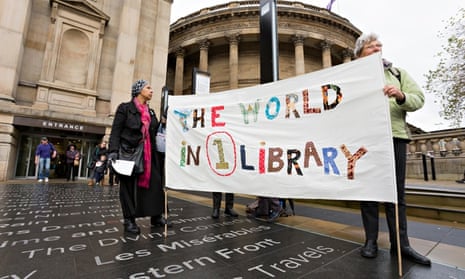Actor David Morrissey – one of Liverpool’s favourite sons – said in an interview with the Guardian on 6 March, that his hometown is “a place that takes the arts seriously and fights for it”.
He’s right.
Since being European capital of culture in 2008, this city has seen a cultural renaissance, underpinned by public investment. Liverpool city council funds more than 40 small, medium and large cultural organisations from the public purse, and although we are facing some of the most savage cuts of any authority in the country, we continue to do so.
It’s a good investment: we get £12 back for every £1 we spend and it is crucial for our visitor economy that we have world class culture on offer every day of the year. But more than that, culture is what gives this city its soul and its spirit. It’s what makes people visit here, study here, live here and bring up their families here. It is our lifeblood.
So it’s heart-breaking to see the unnecessary decimation of cultural assets we are witnessing in cities such as Bradford, where the National Media Museum’s archive is being boxed up and shipped to London. At the same time, it’s been announced that three major London museums attracted more visitors between them in 2015 than the whole of Venice. That’s an incredible achievement. But where the press coverage on Bradford has focused on a lack of funding, there’s been a noticeable absence of money talk about those London powerhouses.
In fact, between them, those three organisations – the Victoria and Albert, the Natural History Museum and the Science Museum – receive £125m of central government subsidy a year. In comparison, National Museums Liverpool receives £20m to run seven iconic buildings that house some of the nation’s most important collections.
The British Library gets £107m a year. Liverpool Central, the world’s first public library and one of this city’s most important and well-loved institutions, gets nothing.
It can be hard to make a comparison, but there is definitely a chasm developing between those who seem to be getting cultural investment and those who are not. This is not just about public subsidy. The proposed garden bridge over the Thames – known in these parts as “Boris’s folly” – is a perfect case in point. The £60m of committed public funding is an eye-watering figure, but more amazing is the £115m of private money that has reportedly been raised for a project still in planning.
It just shows what a beast London is: a global powerhouse with big business and private donors lining up to pump money into the arts. The rest of the UK is just not in that league.
So when you have a city that is sucking up huge amounts of public subsidy as well as emptying the deep pockets of the corporate world, it starts to feel like the odds are stacked against anyone outside of London – a wrecking ball leaving a trail of shattered ambition and hope in its wake.
So what is the answer? This is not a rant. It is a plea. A plea to start looking at the arts and culture sector in the UK as a whole, not as a collection of individual parts.
Liverpool doesn’t want to be London. We don’t want to be Manchester or Leeds or Newcastle for that matter.
But we do want a joined-up cultural conversation with all of those cities and more, one that recognises that the current levels of both public and private money are monumentally stacked in favour of the capital, and that just a slight redressing of that balance could have a seismic impact on the north and with it the whole of the UK.
A fairer spread of investment will lead to iconic buildings, incredible performances and wonderful collections not being consigned to the past but being part of a bright future. It’s not like we are short of great ideas in the north, we’re just sometimes short of the political will to make those things happen.
Culture is at the heart of Liverpool’s devolution deal, a clear sign of its importance to the whole region and recognition that our financial challenges must be met with bold, imaginative and innovative solutions to maintain our progress.
We now need to see that approach mirrored on the national stage before arts and culture outside London becomes a distant memory.
Joe Anderson is Mayor of Liverpool
Talk to us on Twitter via @Guardianpublic and sign up for your free weekly Guardian Public Leaders newsletter with news and analysis sent direct to you every Thursday.
